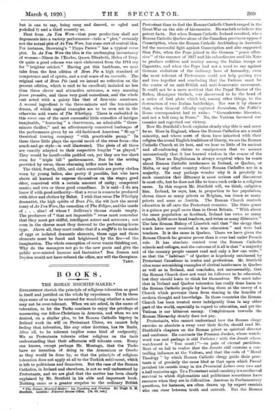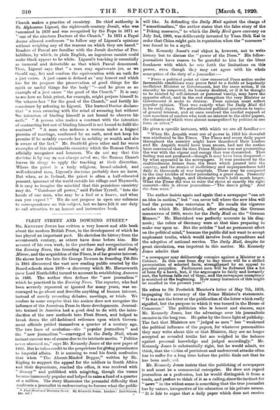BOOKS.
THE ROMAN MISCHIEF-MAKER.* Evorssuaiuw cherish the principle of religions toleration as good in itself and justified on the whole by experience. Yet in these days some of us may be excused for wondering whether a nation may not be over-tolerant. When we are asked, in the name of toleration, to let the Turks continue to enjoy the privilege of massacring our fellow-Christians in Armenia, and when we are desired, on a similar plea, to let Roman Catholic bigotry in Ireland work its will on Protestant Ulster, we cannot help feeling that toleration, like any other doctrine, has its limits. After all, to be tolerant implies some kind of reciprocity. We as Protestants tolerate other religions on the tacit understanding that their adherents will tolerate ours. Every one knows, except perhaps Mr. Montagu, that the Turks have no intention of doing to the Armenians or Greeks as they would be done by, so that the principle of religions toleration does not apply at all to the Turkish settlement, which is left to politicians and financiers. But the case of the Roman Catholics, in Ireland and elsewhere, is not so well understood by Protestants, and we are glad that the matter has been clearly explained by Mr. Stutfield in his able and important book. Nothing came as a greater surprise to the ordinary British
• The Roman Mischief-Maker : his Teaching and Practice By Heigh B. IL Btutdield. London : National Review Mak (7.. ed. not.]
Protestant than to find the Roman Catholic Church ranged in the Great War on the side of his enemies. He was loth to believe the patent facts. But when Roman Catholic Ireland revolted, when Roman Catholic Quebec alone of the Canadian provinces opposed Conscription, when the Roman Catholic Archbishop in Australia led the successful fight against Conscription and also supported Shin Fein, when the Pope joined in the German " peace offen- sive " of the summer of 1917 and his subordinates used his Note to produce sedition and mutiny among the Italian troops at Caporetto, and when the Pope had not a word to say against German violations of the ordinary laws of humanity, even the most tolerant of Protestants could not help putting two and two together and concluding that the Vatican must be the centre of an anti-British and anti-democratic movement. It could not be a mere accident that the Papal Master of the Robes, Monsignor Gerlach, was discovered to be the head of a series of foul plots which led, among other things, to the destruction of two Italian battleships. Nor was it by chance
that, when General Allenby captured Jerusalem, the Tablet's Rome correspondent had to write : " Gerusalemme liberator, and not a bell rang in Rome." No, the Vatican favoured our enemies and regretted our victory.
Now Mr. Stutfield's book explains clearly why this is and must be so. Here in England, where the Roman Catholics are a small minority, and where most of them have inherited with their religion the sound English traditions of liberty, we see the Roman Catholic Church at its best, and we hear so little of its ancient and all-embracing claims to omnipotence that we assume unconsciously that it has learned wisdom in the course of the ages. Thus an Englishman is always sceptical when he reads about Roman Catholic intolerance in Ireland, or Quebec, or Malta, or any other country where Roman Catholics are in a majority. He may perhaps wonder why it is precisely in such countries that illiteracy is most serious and discontent is most rife, but he does not like to trace such evils to a religious cause. In this respect Mr. Stutfield will, we think, enlighten him. Ireland, he says, has, in proportion to her population, eleven times as many priests as Belgium, ten times as many priests and nuns as Austria. The Roman Church controls education in all save the Protestant counties. The State grant is a guinea per pupil more than in Great Britain. " With about the same population as Scotland, Ireland has twice as many schools, 3,500 more head teachers, and twice as many illiterates."
The late Roman Bishop of Limerick said that "the clergy that teach have never received a true education " and were bad teachers. It is the same in Quebec. There we have given the Roman Church far greater power than it ever had under French rule. It has absolute control over the Roman Catholic schools and colleges, and the outcome of it all is that " a majority of the country people cannot read and only a few can write," so that the " habitant " of Quebec is hopelessly outclassed by Protestant Canadians in trades and professions. Mr. Stutfield cites some astonishing examples of clerical intolerance in Quebec as well as in Ireland, and concludes, not unreasonably, that the Roman Churoh does not want its followers to be educated, lest they should learn to think for themselves. We must infer that in Ireland and Quebec toleration has really done harm to
the Roman Catholic people by leaving them at the mercy of a Church which prevents them from sharing in the benefits of modern thought and knowledge. In those countries the Roman Church has been treated more indulgently than in any other part of the world, especially in regard to education, and yet the Vatican is our bitterest enemy. Complaisance towards the Roman Hierarchy clearly does not pay.
Protestants, who cannot understand how the Roman clergy exercise so absolute a sway over their flocks, should road Mr.
Stutfield's chapters on the Roman priest as spiritual director and confessor. He contrasts the Prussian Junker, whose watch- word was and perhaps is still Verboten / with the Jesuit whose watchword is " You must I "—on pain of eternal perdition.
Most of us fail to realize that the Jesuits still exercise a con- trolling influence at the Vatican, and that the code of " Moral Theology " by which Roman Catholic clergy guide their peni-
tents is of precisely the same kind as that upon which Pascal lavished his caustic' irony in the Provincial Letters over two and
a half centuries ago. To a Protestant mind casuistry is a mediaeval survival to which diplomatists and politicians sometimes have recourse when they are in difficulties. Answers to Parliamentary questions, for instance, are often drawn up by expert casuists who can steer between truth and untruth. But the Roman Church makes a practice of casuistry. Its chief authority is St. Alphonsus Liguori, the eighteenth-century Jesuit, who was canonized in 1839 and was recognized by the Pope in 1871 as
one of the nineteen Doctors of the Church." In 1831 a Papal decree allowed confessors " to follow any of Liguori's opinions without weighing any of the reasons on which they are based." Readers of Pascal are familiar with the Jesuit doctrine of Pro- babilism, by which, in plain English, an ingenious casuist could make black appear to be white. Liguori's teaching is essentially as immoral and detestable as that which Pascal denounced. Thus, Liguori says that " a man may equivocate (or, as we should say, lie) and confirm the equivocation with an oath for a just cause. A just cause is defined as any honest end which has for its purpose the preservation of good things for the spirit or useful things for the body' "—and he gives as an example of a just cause " the good of the Church." It is easy to see how an Irish priest, for example, might perjure himself in the witness-box "for the good of the Church," and fortify his conscience by referring to Liguori. The learned Doctor declares that " a man swearing with the mind of swearing but without the intention of binding himself is not bound to observe his oath." " A person who makes a contract with the intention of contracting but not of binding himself is not bound to fulfil the contract." " A man who seduces a woman under a feigned promise of marriage, confirmed by an oath, need not keep his promise if he notably exceeds her in nobility or wealth and she Is aware of the fact." Mr. Stutfield gives other and far worse examples of this abominable casuistry which the Roman Church officially recognizes and honours. We do not say that this doctrine is by any mans always acted on; the Roman Church leaves its clergy to apply the teaching at their discretion. Where the priest is a truly religious, broad-minded, and well-educated man, Liguori's doctrine probably does no harm. But when, as in Ireland, the priest is often a half-educated peasant, ignorant of the world outside his village and Maynooth, it is easy to imagine the mischief that this pernicious casuistry may do. " Condense all power," said Father Tyrrell, " into the hands of one man, who may be a fool or a knave, and what can you expect ? " We do not propose to open our columns to correspondence on this subject, but we have felt it our duty to call attention to an honest and instructive book.











































 Previous page
Previous page